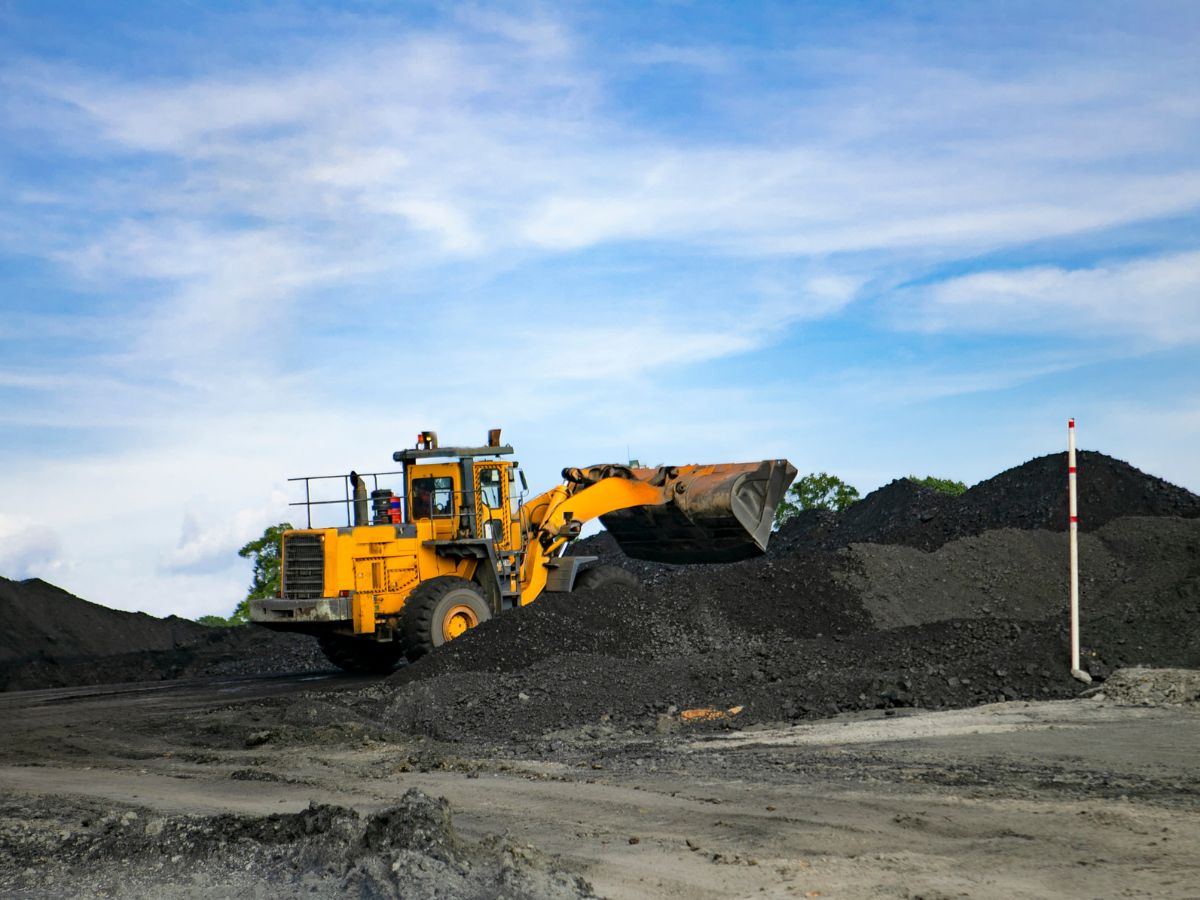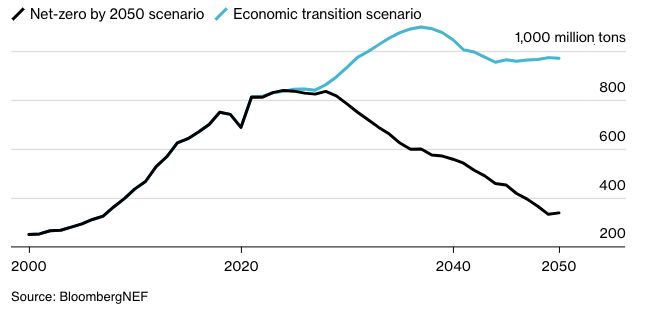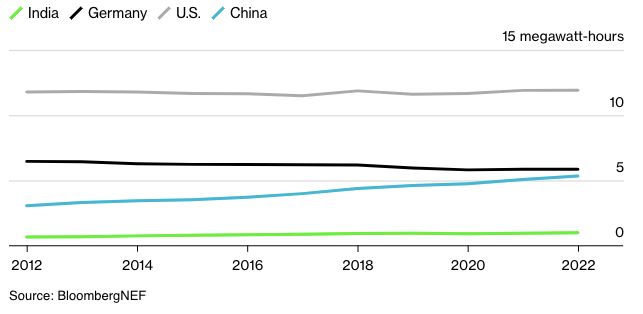Business
India’s plans to double coal production ignore climate threat

The South Asian giant is setting new targets to use more coal, despite committing to transitioning away from fossil fuels.
As climate diplomats at COP28 in Dubai debated an agreement to transition away from fossil fuels last December, India was facing another energy conundrum: It needed to build more power capacity, fast.
“To meet growing demand,” the Indian government said on Dec. 11 it expects to roughly double coal production, reaching 1.5 billion tons by 2030. Later, the power minister Raj Kumar Singh set out plans on Dec. 22 to add 88 gigawatts of thermal power plants by 2032. The vast majority of which will burn coal.
The move to invest more in the world’s dirtiest fuel – one of the biggest contributors to global warming – may seem counterintuitive for the South Asian country, which is highly vulnerable to climate impacts. Yet, as the country heads into elections during April and May, Prime Minister Narendra Modi is keen to avoid any risks of power shortages. Along with record heat waves India has seen big spikes in peak demand for electricity over two successive years.
“India’s policy is to build everything. Push for renewables, but also push for coal and other fossil fuels,” said Sandeep Pai, director of the climate-focused organization Swaniti Global. “The justification is an increase in power demand.”
When it comes to renewable energy, however, India is failing to build enough to meet its ambitious goal of 500 gigawatts of clean-energy capacity by 2030. The rates at which solar and wind power was installed over the past few years is about a third of what’s needed, according to BloombergNEF.
There is a combination of factors affecting the renewables rollout. The top reasons, says Rohit Gadre of BNEF, are the misaligned incentives of state-owned electricity retailers, difficulty of acquiring the land necessary, and lack of consistent policies at federal and state levels. As a result, even as the demand for power is rising, there’s not enough appetite among private investors to speed up renewable investments.
That is not to say things will be smooth for coal either, which is facing similar challenges in attracting new investment. “Solar and wind power plants can be built quickly, whereas coal power plants will take much longer and at higher costs,” said Vibhuti Garg, South Asia director for the non-profit Institute for Energy Economics and Financial Analysis.
Neither Pai nor Gadre expects India to reach the coal targets it has set. BNEF’s economic transition scenario sees India’s coal use topping out at 1.1 billion tons before 2040.
India’s Coal Use
Even under the business-as-usual scenario, India’s annual consumption of the dirtiest fossil fuel is not expected to reach 1.5 billion tons

Ultimately, India needs investment in its energy infrastructure as the lower middle-income country seeks economic growth. Per capita electricity consumption for India is far below those of developed countries or even China. And India is still far from using up its fair share of the global carbon budget.
India, as well as other big developing countries, also need more incentives to choose a greener path. Over the last three years, the Group of Seven Nations have designed the Just Energy Transition Partnership to help South Africa, Vietnam, and Indonesia to reduce coal use. Those deals have been messy and have yet to show results.
Electricity Consumption Per Capita

While the world may have agreed to transition away from fossil fuels at COP28, it hasn’t found effective ways to help countries like India replace coal, environment minister Bhupendra Yadav suggested this week at a launch for the book titled Modi Energising A Green Future. That doesn’t have to be simply about rich countries handing out cash, he said at the event, but better policies, technology transfer, and skills training are also needed.
Pai echoed this view. “The world needs to offer something to India to not carbonize,” he said. “The main challenge is the world really doesn’t offer much to India or to any developing country.”
© Bloomberg
Business
Legal Intelligence Firm redefines regulatory compliance with high-profile hire

In a world in constant flux, unpredictability has become the norm: socio-political shifts, the
increasing interconnectedness of multinational companies and ever-changing and expanding
body of laws and regulations means that compliance is becoming increasingly complex. As
such, governance, risk, and compliance (GRC) has become relevant now more than ever, and
artificial intelligence-driven technology is equipping organisations to make decisions in the face of uncertainty.
Months after acquiring big data software developer Pythagoria to intensify their data intelligence offering, legal-tech pioneer Afriwise has appointed GRC juggernaut Vishala Panday to champion product innovation and solutions around compliance to empower organisations operating in Africa to navigate complex legal and regulatory landscapes.
As the Head of Compliance Services, Panday’s expertise lies in the intersection of compliance,
technology, and organisational strategy. According to Panday, Afriwise is the next natural step in her career as it presents her with a significant opportunity to consolidate and utilise her diverse and multi-faceted experience to evolve GRC practices across African industries. “I was initially drawn to Afriwise’s client-centricity and commitment to cultivating the cutting edge of legal technology. Afriwise offers a powerful combination of proprietary legal and regulatory databases, AI, and expert analysis from top legal counsel and empowers African-operating businesses to make intuitive, meaningful decisions in real-time. I am excited to apply my depth of experience to develop tailor-made fit-for-purpose client solutions that add real and tangible value to business decision-making and risk mitigation.”
Panday believes that the value derived from structured data, artificial intelligence and
technology in the realm of regulatory compliance is intrinsic to business success. In order to
remain competitive, utilising technology to make quicker and better-informed decisions is a
business imperative. “Ethics and Compliance in business can err on the side of esoteric –
executive buy-in becomes less likely when the value is not explicit, tangible, or visible. My
approach to ethics and compliance is grounded in realism; GRC outcomes must be practical,
cost-effective, realistic to implement, and most of all, business-driven,” says Panday.
Many legal teams across the globe are becoming smaller and leaner, and conversely, the
regulatory landscape is ever-changing and growing. Most organisations do not have the luxury
of additional sets of hands to process reams of legal information in order to ultimately make
business decisions. Leveraging off of structured data and AI makes it possible for lean legal and compliance functions to evolve their roles into strategic business partners by delivering
practical, high-quality, and timely information to critical business stakeholders.
Prior to joining Afriwise, Panday enjoyed a decade-long tenure as Head of Ethics and Compliance at Barloworld Equipment, where she built an ethics and compliance function from scratch using a centre-led approach cutting across all of the African jurisdictions of operation. Within her first 12 months on the job, Panday rolled out an anti-corruption programme that included the management of the whistleblowing line, and investigations into ethical violations. This programme secured her the title of “Changemaker of the Year”, and she credits the ability to sink her teeth into a whole spectrum of ethical issues within a large corporate environment to her intuitive and practical approaches to compliance.
Panday’s non-traditional modus operandi is shaped by a culmination of understanding of
business best practice coupled with her foundational legal experience. “Early on in my career, I
learnt very quickly that assessing GRC through the lens of a traditional legal practitioner was
insufficient. Traditional legal practice means that the in-house counsel or legal advisor operates at arms-length of the core business environment, operating simply as a support functionary who generally advises reactively, rather than strategize with stakeholders proactively. In order to be effective in my role as a GRC functionary, I needed to become part of the business. To enhance her business and strategic acumen, Vishala went on to pursue a BCOM in Finance early on in her career, shortly after acquiring her LLB degree, and more recently, during 2022 completed an MPhil in International Business through the Gordon Institute of Business. It is this business acumen that provides me with a more practical approach to the application of ethics and compliance within corporate settings.
Steven De Backer, CEO and Founder of Afriwise says that Panday’s vision will pave the way
for even greater business success. “Vishala Panday is a highly regarded GRC professional and
it is a great privilege to have her on board to develop new and innovative products and help
evolve our compliance offering. Vishala is an individual of astute moral integrity with a wealth of knowledge; she will be a guiding force to not only transform how we do business but set a new standard for the industry at large. In many ways, she feels like Afriwise’s missing puzzle piece.”
CONTACT INFORMATION
Issued on behalf of Afriwise by:
Lauren Crooks
lauren@lockandkeyconsulting.co.za
+27 82 078 7199
ABOUT AFRIWISE
Leading provider of integrated legal and regulatory intelligence solutions in Africa
Afriwise is an award-winning legal intelligence platform, transforming and democratising access to legal and regulatory information across Africa and beyond. At Afriwise, we help organisations, whatever their size, advance their business in Africa and gain a competitive advantage by providing them with business, legal, and regulatory intelligence based on technology and human expertise.
Afriwise is the result of years of experience and trust building, through close
collaboration with firms across Africa, to give you easy and instant access to the expertise and
know-how you need about local markets on the continent. Our collaboration with over 150 law
firms on the continent is further testimony of our team’s deep links within Africa. By leveraging our unparalleled database, cutting-edge NLP technology, in-house expertise, and extensive network we help solve our clients’ most pressing legal and regulatory challenges.
Video:
Website: www.afriwise.com
Business
BMW and Jaguar used banned China parts – US probe

BMW, Jaguar Land Rover (JLR) and Volkswagen (VW) used parts made by a supplier on a list of firms banned over alleged links to Chinese forced labour, a US congressional report has said.
At least 8,000 BMW Mini Cooper cars were imported into the US with components from banned Chinese firm Sichuan Jingweida Technology Group (JWD), according to the report by Senate Finance Committee chairman Ron Wyden’s staff.
“Automakers’ self-policing is clearly not doing the job,” the Democrat Senator said.
Jaguar Land Rover told the BBC it “takes human rights and forced labour issues seriously and has an active ongoing programme of human rights protection and anti-slavery measures”.
BMW and VW did not immediately respond to requests for comment.
Mr Wyden also urged the US Customs and Border Protection agency to “supercharge enforcement and crack down on companies that fuel the shameful use of forced labour in China”.
The report added Jaguar Land Rover had imported spare parts which included components from JWD after the company was put on the banned list.
JLR said it has now identified and is destroying any stock it holds around the world that include this component.
In February, VW said thousands of its vehicles, including Porsches and Bentleys, had been held by authorities because they had a component in them that breached America’s anti-forced labour laws.
VW had voluntarily informed customs officials about the issue, the report said.
Congress passed the Uyghur Forced Labor Prevention Act (UFLPA) into law in 2021.
The legislation is intended to prevent the import of goods from China’s north-western Xinjiang region that are believed to have been made by people from the Uyghur minority group in forced labour conditions.
JWD was added to the UFLPA Entity List in December 2023, which means its products are presumed to be made with forced labour.
China has been accused of detaining more than one million Uyghurs in Xinjiang against their will over the past few years.
Authorities have denied all allegations of human rights abuses in Xinjiang.
“The so-called Uyghur Forced Labor Prevention Act by the US is not about forced labor but about creating unemployment. It does not protect human rights but, under the guise of human rights, harms the survival and employment rights of the people in Xinjiang,” Chinese Foreign Ministry spokesperson Wang Wenbin said.
“China strongly condemns and firmly opposes this. We will take measures to resolutely safeguard the legitimate rights and interests of Chinese enterprises.”
© BBC News
Business
Sony sees higher profit from image sensors, to conduct stock split

Sony Group (6758.T), said on Tuesday it sees operating profit growing 5% to 1.28 trillion yen ($8.2 billion) this business year with a boost coming from its image sensors.
Sony is a major supplier of image sensors for smartphones and that business is expected to book a 40% rise in operating profit on higher sales and lower costs.
The Japanese conglomerate said it would conduct a five-for-one stock split and buy back up to 2.46% of its shares worth 250 billion yen.
It sold 20.8 million PlayStation 5 units last year, narrowly missing its revised target of 21 million units issued in February following weaker-than-expected sales over the year-end shopping season.
Sony sees profits at its gaming business rising 7% in the current year due to smaller hardware losses as it sells fewer consoles, and higher sales from its PlayStation Plus subscription service.
Known as the inventor of the Walkman and the MiniDisc, Sony has transformed from an electronics manufacturer into an entertainment and technology juggernaut spanning movies, music and games and chips.
The Japanese tech conglomerate plans a partial spin-off of its financial unit with a listing in October 2025 in order to focus on its entertainment and chips units.
The gaming sector has been hit by a slowdown with Xbox maker Microsoft (MSFT.O), last week moving to shutter studios including Tokyo-based Tango Gameworks in the latest cost-cutting measures.
Sony said in February it would lay off 900 workers at its gaming business and shutter a London studio.
Sony Pictures last week sent a letter expressing interest in acquiring Paramount (PARA.O), with private equity firm Apollo (APO.N), Reuters reported.
A deal would create a formidable Hollywood studio with a share of around 20% of the North American box office.
In the year ended March, Sony recorded a 7% fall in operating profit, due to lower profits at its life insurance business. The result was in line with estimates.
© Reuters
Business
Eskom’s energy availability factor has breached the 70% as R53 million spent on diesel last week to power Open Cycle Gas Turbines

Electricity Minister Kgosientsho Ramokgopa stated on Monday that Eskom’s Energy Availability Factor (EAF) has breached the 70%, while just over R53.4 million was spent on burning diesel to power the Open Cycle Gas Turbines (OCGT) last week.
Eskom has consistently defended it’s use of OCTG’s, saying it was only being used during morning and evening peaks to meet high electricity demand when it is necessary.
The power utility says South Africa is currently in a load shedding free environment, not because they are burning diesel to keep the lights on, but because of their extensive maintenance programme and success of their Generation Operational Recovery Plan, which was initiated in March last year.
According to Ramokgopa, who spoke during a media briefing on Monday, the EAF has breached the 70% mark and is currently tracking at 70.78%. This is the first time the EAF has breached 70% since August 2021.
For the month-to-date, the EAF is at 64,34% and year-to-date (YTD) the EAF has reached 59,92%.
Load shedding has been suspended for 47 consecutive days during which time the OCGT usage has been lower than the same time as last year. Ramokgopa said between May 5 to 11, OCGTs were in use for just four days, with just over R53 million spent on diesel on those four days.
On Monday, R23.5 million was spent on diesel to power the OCTGs, R11.9 million was spent on Tuesday and Wednesday, and R6.4 million was spent on Thursday.
Eskom said that South Africa has been without load shedding due to the utility having sufficient generation capacity from a more reliable generation fleet and has denied reports in the Mail and Guardian that it was overusing its diesel-burning OCGTs.
In April this year, Eskom spent R1.1 billion on OCGTs, producing 167.8 Gigawatt hours (GWh).
This was about 60% less than April 2023, when a staggering R3.1 billion was spent to produce 470.22GWh, the utility said.
Ramokgopa said that the OCGT load factor for April 2024 decreased significantly to 6.8% compared to last year’s figure of 19.13%.
Eskom said that its diesel budget from May to June was R5.8 billion, and only R1.16bn had been spent as of May 9, 2024, or 19.7% of the total budget.
Generation performance
The minister said that consistently good performance has come from the Kusile, Lethabo, Majuba, Matla and Medupi power stations, and these stations have helped contribute to the EAF trend.
Eskom noted that Medupi and Lethabo, specifically, have achieved a YTD EAF greater than 70% (peaking at 87.6%,) by the end of March 2024.
In terms of stations showing an improved trajectory, the minister said that the EAF has been assisted by improving performance from the Arnot, Camden, Hendrina and Grootvlei power plants.
He said suspension of load shedding is driven by an improvement in coal fleet performance, supported by solar during the day.
On Friday, Eskom said in a statement that unplanned outages have reduced by 4,400MW since April 26, 2024, due to extensive maintenance.
“Eskom’s outlook for the winter period of 2024 states it will continue to strategically utilise its peaking stations, including OCGTs – these will be dispatched during morning and evening peaks to meet high electricity demand, when necessary,” Eskom said.
‘End of load shedding is in sight’
On Monday, President Cyril Ramaphosa praised the Energy Action Plan and said that the end to load shedding is in sight.
“It is too early to say that load shedding has been brought to an end. However, the sustained improvement in the performance of Eskom’s power stations, as well as the new generation capacity we have added to our energy system gives us hope that the end of load shedding is in sight,” Ramaphosa said in his weekly newsletter.
“A renewed focus by Eskom on maintenance and the return to service of several units is now showing results. Losses due to unplanned outages have reduced by nine percent between April 2023 and March 2024, adding the equivalent of 4,400MW of capacity to our national grid,” he added.
“Better maintained and more reliable power stations have increased the country’s EAF. The EAF has been above 60% since April, compared to 53% over the same period last year.”
Ramaphosa also praised Eskom’s leadership team and highlighted the work done by the power station general managers and their teams.
“The leadership, management and staff of Eskom, particularly the power station general managers and their teams, are to be commended for their efforts. The work of the National Energy Crisis Committee, which coordinates the response across government, has also been vital. The strong partnership with business and the support of other social partners has enabled the deployment of valuable resources and expertise,” he concluded.
© IOL










You must be logged in to post a comment Login